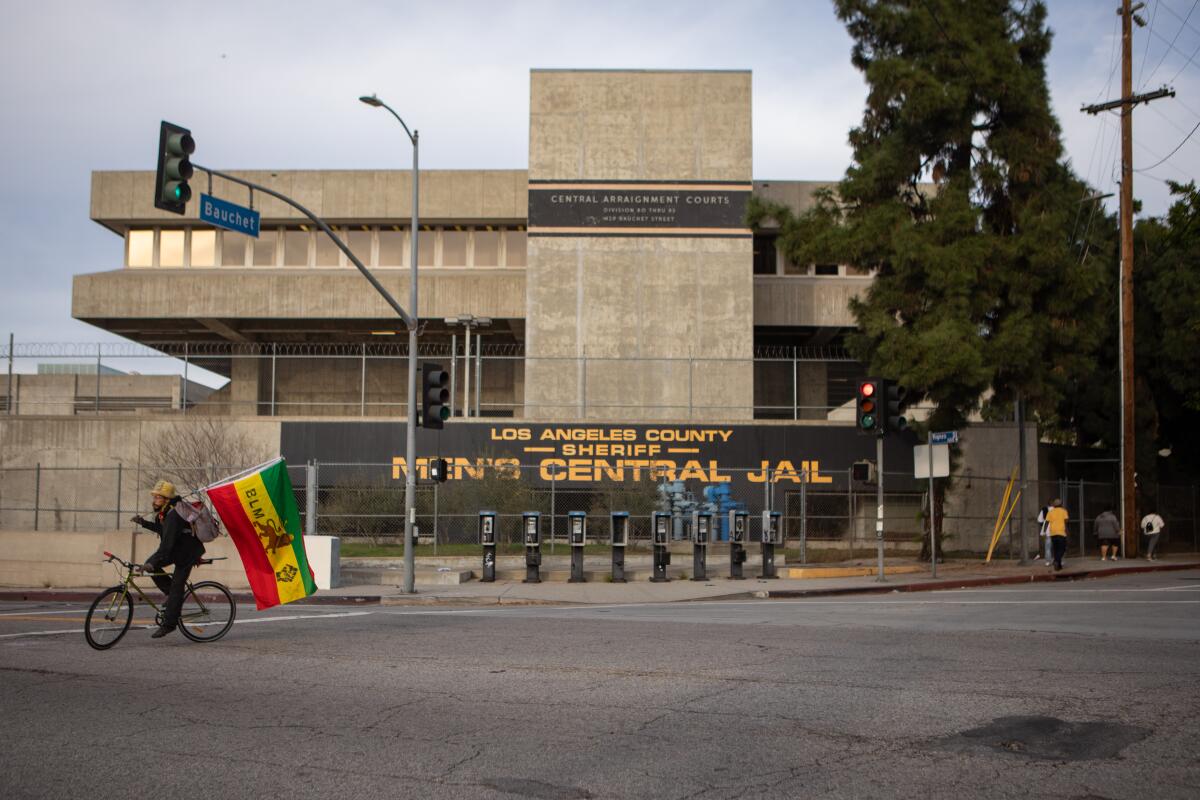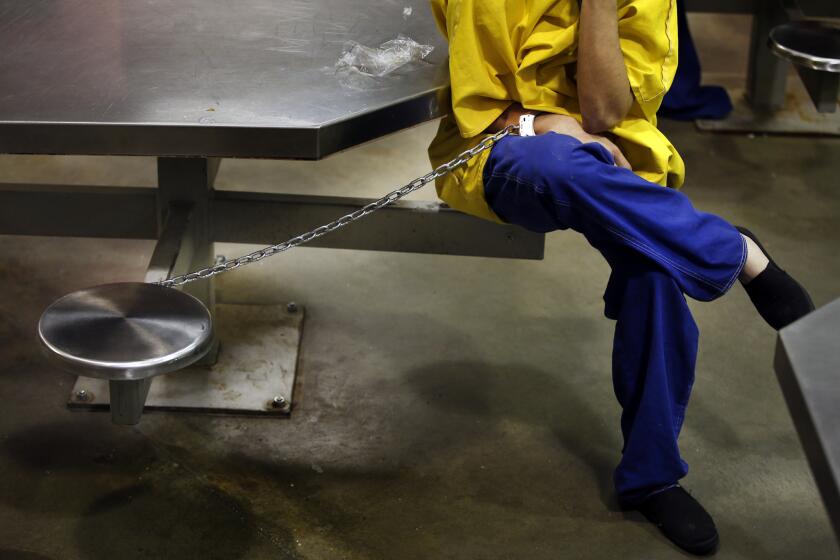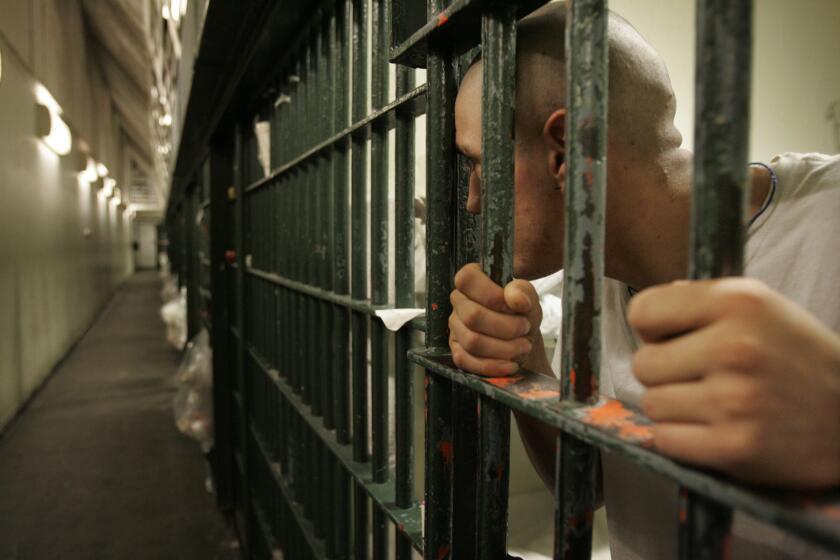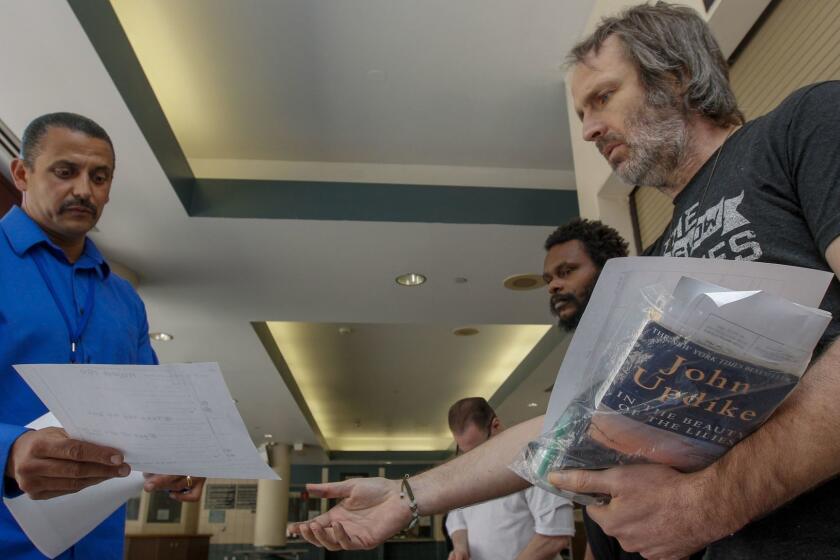After more than six years of federal oversight, dangerous problems persist in L.A. County jails

- Share via
Many inmates with serious mental illnesses in Los Angeles County jails continue to suffer in isolation and with little treatment, more than six years after the Sheriff’s Department reached a settlement with the federal government.
The county remains out of compliance with the settlement’s main requirements — ensuring that inmates with serious mental illnesses receive regular treatment, out-of-cell time and safe housing, according to a court-appointed monitor.
In Men’s Central Jail, many cells were overflowing with garbage, and filth was spread on the walls, with a pile of razors abandoned in a hallway, the monitor, Nicholas E. Mitchell, said in a report.
Last June, about 40% of inmates in the nation’s largest county jail system were diagnosed with mental illness — 5,620 in all.
On Friday, a federal judge outlined benchmarks that the county must meet before May 15.
Under the plan, the county is required to achieve “substantial compliance” by 2024 — nine years after the settlement was reached in August 2015.
Capping years of scandal, the Los Angeles County Sheriff’s Department has agreed to federal oversight of its jail system in an effort to end abuse of inmates by sheriff’s deputies and to improve chronically poor treatment of mentally ill inmates.
County attorneys have expressed reservations about meeting that goal.
U.S. District Judge Dean D. Pregerson said at a hearing Friday that he was concerned about the “revolving door” of inmates with mental illnesses who don’t receive discharge plans, including how they will receive medicine and therapy once released.
Last year, the number of inmates who died by suicide in L.A. County jails was the highest since the settlement, Assistant U.S. Atty. Matthew Nickell said at the hearing.
A surge in suicides in county jails was part of what led federal officials to seek the agreement.
Citing a dramatic increase in jail suicides and “deplorable” conditions for mentally ill inmates, the U.S.
Deputy Alejandra Parra, a public information officer with the L.A. County Sheriff’s Department, said the agency was unable to comment on ongoing litigation. Coral Itzcalli, a spokesperson for the county Department of Health Services, which provides mental health care in the jails, said the same.
Peter Eliasberg, chief counsel at the ACLU of Southern California, said the county’s failure to provide constitutionally required mental health care in the jails dates back decades.
He cited a 1997 federal report that found issues similar to those that inmates still face today.
“We’re really talking about 25 years of violating the rights of some of the most vulnerable people in our community,” Eliasberg said. “It is frankly disgraceful.”
Inmates: Haphazard records, lack of medications and overcrowding are cited in report ordered by Justice Department. Improvements are underway, officials say.
Miriam Krinsky led a citizens commission that issued a seminal report on jail violence in 2012, before the federal settlement.
A former federal prosecutor who now heads the nonprofit Fair and Just Prosecution, Krinsky said mental health care needs to start well before people end up behind bars.
“There needs to be a louder outcry to underscore that removing people from their communities under the assumption that it makes us safer, when they don’t pose a danger to the community, they commit lower level offenses driven by mental health or substance use disorders, doesn’t make our community healthier or safer,” she said.
The federal settlement was reached under then-Sheriff Jim McDonnell less than a year after he was elected amid scandals over mistreatment of inmates in the jails.
Alex Villanueva unseated McDonnell as sheriff in 2018 and has been in charge of the jails since then.
Mitchell, the federal monitor, who regularly inspects the county jails under the settlement, wrote in a damning report in September that initially, officials made meaningful progress. Now, he wrote, that progress has “slowed to a halt.”
The county has pointed to the substantial challenges of COVID-19, but Mitchell argued that was not an excuse.
The federal settlement required intensive mental heath treatment for jail inmates, but the county hasn’t provided the money to achieve those goals, Mitchell said in his report.
In recent years, L.A. County supervisors have made efforts to channel minor offenders with mental health needs into treatment and housing programs, rather than jail.
A door opened, and three men walked out of captivity into a sun-drenched waiting area.
But L.A. County still needs almost 1,500 inpatient mental health beds and 4,000 permanent supportive housing units, according to the federal monitor’s report.
Inside the jails, conditions have worsened for inmates with the most serious mental illnesses.
In high observation units, inmates are locked in cells by themselves and let out only for very limited periods, Mitchell’s report noted.
When Mitchell’s team visited, some inmates were asleep and others were pacing back and forth in their cells.
Few were in a condition to acknowledge, let alone answer, questions posed by team members, the report said.
More to Read
Sign up for Essential California
The most important California stories and recommendations in your inbox every morning.
You may occasionally receive promotional content from the Los Angeles Times.














